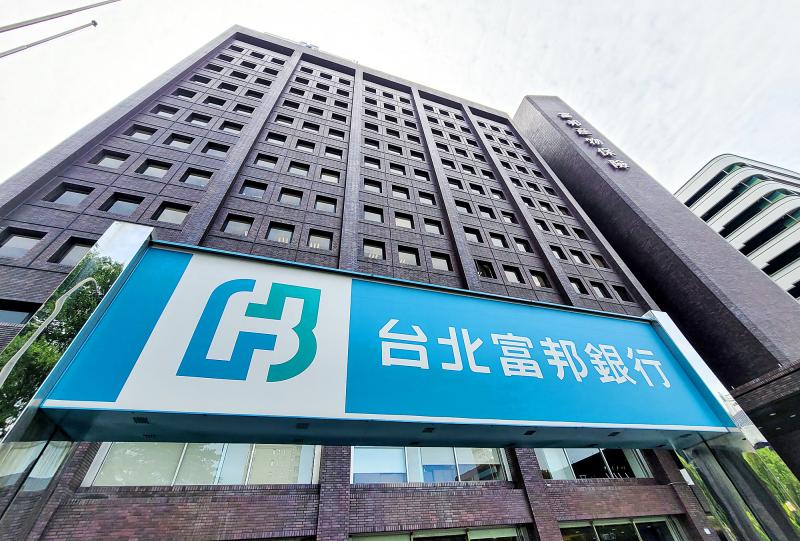Fubon Financial Holding Co (富邦金控) yesterday said that its insurance unit would weather rising COVID-19 insurance claims and no fundraising is needed.
Fubon Insurance Co (富邦產險) said it has sold about 2.31 million COVID-19 insurance policies and as of the middle of this month had paid NT$1.1 billion (US$37.09 million) of claims from 29,000 policyholders.
It pays a total of NT$50 million per day in claims, it said.

Photo: CNA
It is difficult to calculate how much more compensation it would have to pay, as local COVID-19 infections are still on the rise, with a peak not expected until next month, Fubon Insurance said.
Fubon Insurance reiterated that it would not avoid its responsibility to policyholders.
“Fubon Insurance has net value of NT$30 billion to NT$40 billion, and assets of NT$130 billion, not to mention the high net value of Fubon Financial,” Fubon Financial president Jerry Harn (韓蔚廷) told an investors’ conference amid speculation that the company would be unable to bear the burden.
Policyholders would receive compensation, Harn said.
The loss rate on COVID-19 insurance policies was about 15 percent, the company said.
Three factors would affect the figure, including the ultimate number of local infections, the government’s virus policy and clarification of disputes, it said.
If the financial pressure becomes too heavy, Fubon Insurance would consider applying to the Financial Supervisory Commission (FSC) to use part of its special reserve to write off losses, it said.
The insurer can allocate as much as NT$15.5 billion, it said.
Fubon Financial Holding reported an annual decline of 9.4 percent in net profit to NT$46.5 billion for the first quarter, mainly because of a drop of 7 percent in net profit at Fubon Life Insurance Co (富邦人壽) to NT$36.4 billion amid decreasing first-year premiums and lower returns on investments, corporate data showed.
Realized capital gains from fixed-income investments plunged about 75 percent year-on-year to NT$6.7 billion in the first quarter, the data showed.
In related news, China Life Insurance Co (中國人壽) yesterday announced that even though its insurance terms do not stipulate that it must compensate policyholders who catch COVID-19, but are not hospitalized due to the virus, it would pay those who stay home as much as it pays for hospitalizations, as long as they are prescribed drugs.
The drugs are not limited to oral antivirus drugs such as Paxlovid and molnupiravir, or a traditional Chinese compound called Taiwan Chingguan Yihau (清冠一號), or NRICM101, but policyholders should provide prescriptions, a doctor’s diagnosis and a digital COVID-19 certificate with their claims, China Life said.
The FSC has said that insurance firms can decide themselves — while adhering to the terms of their policies — whether to compensate people who catch COVID-19, but are not hospitalized.

BYPASSING CHINA TARIFFS: In the first five months of this year, Foxconn sent US$4.4bn of iPhones to the US from India, compared with US$3.7bn in the whole of last year Nearly all the iPhones exported by Foxconn Technology Group (富士康科技集團) from India went to the US between March and last month, customs data showed, far above last year’s average of 50 percent and a clear sign of Apple Inc’s efforts to bypass high US tariffs imposed on China. The numbers, being reported by Reuters for the first time, show that Apple has realigned its India exports to almost exclusively serve the US market, when previously the devices were more widely distributed to nations including the Netherlands and the Czech Republic. During March to last month, Foxconn, known as Hon Hai Precision Industry

Taiwan Semiconductor Manufacturing Co (TSMC, 台積電) and the University of Tokyo (UTokyo) yesterday announced the launch of the TSMC-UTokyo Lab to promote advanced semiconductor research, education and talent development. The lab is TSMC’s first laboratory collaboration with a university outside Taiwan, the company said in a statement. The lab would leverage “the extensive knowledge, experience, and creativity” of both institutions, the company said. It is located in the Asano Section of UTokyo’s Hongo, Tokyo, campus and would be managed by UTokyo faculty, guided by directors from UTokyo and TSMC, the company said. TSMC began working with UTokyo in 2019, resulting in 21 research projects,

Taiwan’s property market is entering a freeze, with mortgage activity across the nation’s six largest cities plummeting in the first quarter, H&B Realty Co (住商不動產) said yesterday, citing mounting pressure on housing demand amid tighter lending rules and regulatory curbs. Mortgage applications in Taipei, New Taipei City, Taoyuan, Taichung, Tainan and Kaohsiung totaled 28,078 from January to March, a sharp 36.3 percent decline from 44,082 in the same period last year, the nation’s largest real-estate brokerage by franchise said, citing data from the Joint Credit Information Center (JCIC, 聯徵中心). “The simultaneous decline across all six cities reflects just how drastically the market

Ashton Hall’s morning routine involves dunking his head in iced Saratoga Spring Water. For the company that sells the bottled water — Hall’s brand of choice for drinking, brushing his teeth and submerging himself — that is fantastic news. “We’re so thankful to this incredible fitness influencer called Ashton Hall,” Saratoga owner Primo Brands Corp’s CEO Robbert Rietbroek said on an earnings call after Hall’s morning routine video went viral. “He really helped put our brand on the map.” Primo Brands, which was not affiliated with Hall when he made his video, is among the increasing number of companies benefiting from influencer